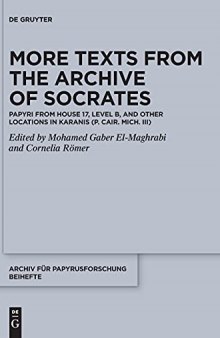 جزییات کتاب
جزییات کتاب
This volume contains editions of 35 texts, which have been excavated nearly 100 years ago in the ancient Egyptian village of Karanis, and which were still waiting publication. As all texts written on papyrus from the Egyptian countryside, these texts give a new insight into the life of the people who dwelled in a typical village of the Roman period in Egypt. The texts show the cultural diversity of those who cohabitated, whether they had Greek or Egyptian names, whether their main gods were the crocodiles or Zeus. In the lives of all of them tax-paying played an important role, as well as caring for their cattle and fields, doing business, and fullfilling the obligations of the Roman government. In particular interesting is the personage of Socrates the tax-collector. Since the ruins of Karanis are still standing (and worth a visit) with two nearly intact temples from the period of the texts, a more complete image of village life emerges from texts and the archaeology behind them. Papyrologists welcome every newly published text as a further stone of the mosaic image that they try to create of the past.



 دانلود کتاب
دانلود کتاب

 جزییات کتاب
جزییات کتاب





 این کتاب رو مطالعه کردید؟ نظر شما چیست؟
این کتاب رو مطالعه کردید؟ نظر شما چیست؟
